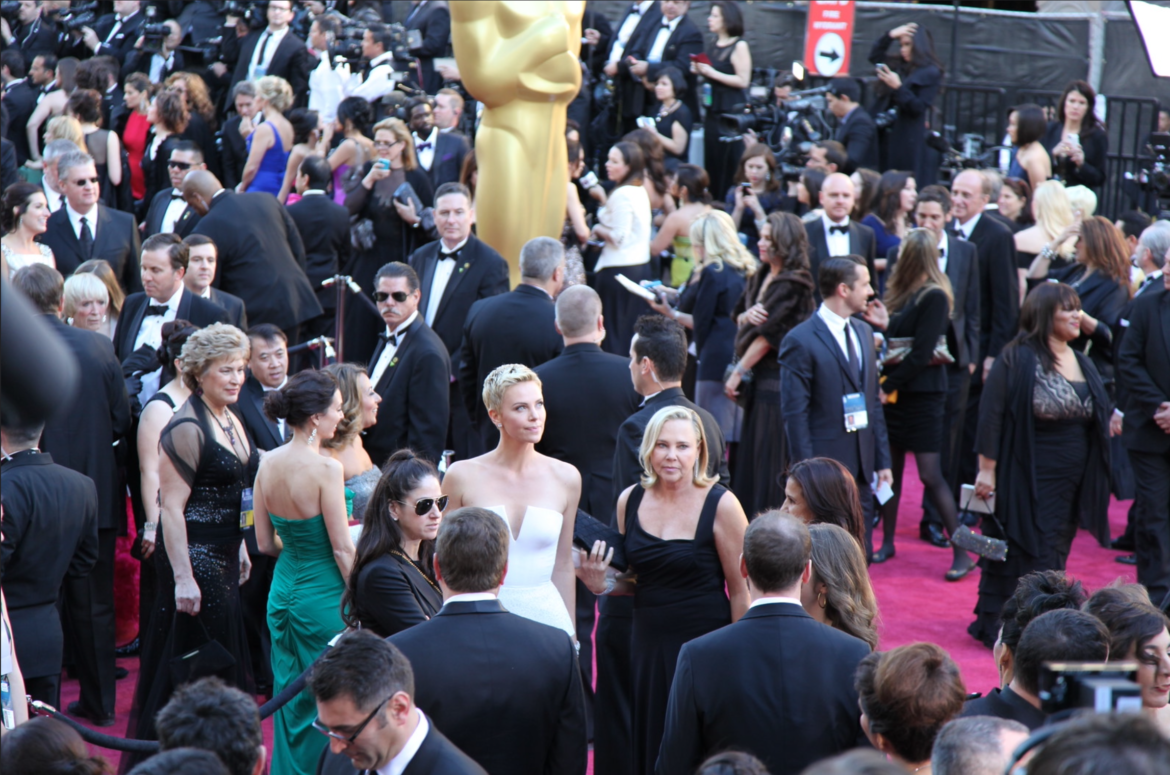In a world marred by international conflict and political controversy at a level that many feel is unprecedented, it is rare to have a public event where these issues do not creep in – the Oscars are no exception. At this year’s ceremony, on March 10, Israel’s ongoing bombardment of Palestine took centre stage. While pro-Palestine protestors delayed the ceremony by mobilizing to obstruct both the red carpet and the theatre itself and many stars–including Billie Eilish, Mark Ruffalo, and Mahershala Ali–wore pins representing Artists4Ceasefire, director Jonathan Glazer’s speech has incurred the most attention.
Accepting the award for Best International Feature Film for the Holocaust film The Zone of Interest, Glazer used his speech as an opportunity to illustrate the connections he saw between the banality of evil showcased in his work and the present-day violence that has resulted in the deaths of over 30,000 Palestinians since October 7. Glazer called on viewers to recognize “All our choices we made to reflect and confront us in the present… Not to say ‘look what they did then’ – rather, ‘look what we do now’”. He went on to say “We stand here as men who refute their Jewishness and the Holocaust being hijacked by an occupation which has led to conflict for so many innocent people. Whether the victims of October 7 in Israel or the ongoing attack on Gaza – all the victims of this dehumanization, how do we resist?” Almost immediately, Glazer faced a flood of backlash, with many media outlets seriously misquoting his speech to make it seem like he was refuting his Jewishness, failing to include the rest of the sentences. On March 18, more than 450 Jewish creatives, including Debra Messing, Jennifer Jason Leigh, and Eli Roth, released an open letter rebuking Glazer and refuting his speech.
Despite the blatant mischaracterization of Glazer’s words that was widespread following the ceremony, he falls in a long line of Hollywood stars who have used the Oscars, and other awards shows, as an opportunity to put a spotlight on political issues they care about. This is not the first time that the Oscars have been the site of a controversial speech surrounding Palestinian issues. At the 1978 ceremony, Vanessa Redgrave–who had also been fairly outspoken about her opposition to the Vietnam War–made waves with her acceptance speech for Best Supporting Actress. After befriending a group of Palestinian students during the production of her film Julia, Redgrave narrated and produced the documentary The Palestinian. Amidst condemnation from groups such as the Anti-Defamation League and a number of Jewish Defense League members who burned effigies of her outside of the ceremony, Redgrave called out “a small bunch of Zionist hoodlums whose behaviour is an insult to the stature of Jews all over the world and to their great and heroic record of struggle against fascism and oppression”. Her speech was met with gasps and boos from the audience, and although she later said that her career was briefly stalled, Redgrave emerged relatively unscathed.
Five years earlier, at the 1973 Oscars ceremony, Marlon Brando sparked even more controversy, when he had Native American actress Sacheen Littlefeather speak in his stead following his Best Actor win for The Godfather. In her speech, Littlefeather explained that Brando could not accept his award in recognition of both Hollywood’s ongoing mistreatment of Native American peoples both on screen and behind the scenes, as well as the recent occupation of Wounded Knee by Native American activists. Although there was some scattered applause throughout her speech, the boos from the audience were predominant, and John Wayne reportedly had to be held back by six security guards from storming onto the stage as she spoke. Littlefeather faced vitriol for the rest of the night, including audience members levying offensive noises and gestures (including the tomahawk chop) as she spoke. Later on, during his presentation, Clint Eastwood quipped, “I don’t know if I should present this award on behalf of all the cowboys shot in all the John Ford westerns over the years”. Following the ceremony, Littlefeather’s career was effectively stalled as she was blacklisted from the industry after J Edgar Hoover reportedly warned Hollywood against hiring her. Despite the intense backlash, Littlefeather’s moment was paramount, given that it was the first time the Oscars were screened outside of the United States, pulling 85 million viewers. This brought unprecedented global attention to Native American freedom fighters in the US.
Activism once again took centre stage during the 2003 Oscars, which occurred just four days after the American invasion of Iraq. Michael Moore received the award for Best Documentary for his film Bowling for Columbine – in itself a political statement calling for stricter gun controls. During the commercial break before his acceptance speech, Moore urged fellow nominees to join him on stage for an anti-war statement, which many, including Martin Scorsese, Cameron Diaz, and Julianne Moore, accepted. His speech, explicitly called out Pres. Bush as a “fictitious president” who “sends us into a fictitious war for fictitious reasons,” going on to proclaim, “We are against this war, Mr. Bush! Shame on you, Mr. Bush! Shame on you!” was met with a cacophony of boos from the audience. Given that the war had just started, and public opinion was largely in favour of Bush’s actions, Moore’s speech was particularly impactful and controversial. He later revealed that the consequences of taking this stand included being shunned by most of the other attendees for the rest of the night, having virulent signs tacked up near his house, enduring a “wall of horse manure about four feet high across [his] driveway”, being villainized by rightwing news outlets, and being assaulted around six times over the next two years.
Redgrave, Littlefeather, and Moore’s experiences exemplify the gauntlet many Hollywood stars face when attempting to engage with current political issues while on the stage. First, they are often ridiculed and rejected by their peers and audiences alike, rendered anathema for daring to speak up. They are then blackballed from the industry, and forced to fight to retain some sort of foothold in the spotlight. Eventually, however, public opinion turns. We learn that Moore was right, that Bush’s purported rationale for his invasion of Iraq was in fact fabricated, and that Indigenous communities continue to face a devastating plight at the hands of the American government, thanks to Littlefeather’s illumination of their ongoing fight. By this time, the same celebrities denounced as pariahs become celebrated instead as brave voices of solidarity in hostile times. Glazer’s speech comes at a critical point in Hollywood specifically, where actors are being penalized for speaking out in support of Palestine. It remains to be seen whether Glazer will get the usual Hollywood treatment–scorned now, embraced later–or whether his words will leave a more permanent impression.
Edited by Shihun Lee

Liliana Mason is in her fourth and final year at McGill University, currently pursuing a B.A. in Political Science with a double minor in African Studies and Canadian Studies. She is particularly interested in African politics, the African diaspora, and the effects of climate change on human migration.

